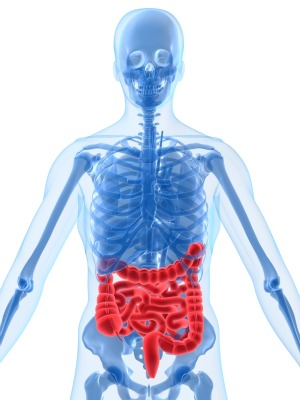
Vanderbilt investigators have discovered a new type of immune cell residing in the intestinal epithelium. The characteristics of the cells — including the types of factors they secrete and their ability to kill bacteria — suggest they function as a first line of defense against ingested pathogens, the team reported in the Sept. 18 issue of the journal Immunity.
“[lquote]This is an entirely new population of cells; no one has previously described it,” said senior author Danyvid Olivares-Villagómez[/lquote], Ph.D., research assistant professor of Pathology, Microbiology and Immunology.
The cells also may be important in the maintenance of the intestinal microbiota — the normal bacterial residents of the intestines, he added.
Olivares-Villagómez and Luc Van Kaer, Ph.D., Elizabeth and John Shapiro Professor of Pathology, Microbiology and Immunology, have focused on the roles of intestinal immune cells and how they interact with each other and with the epithelial cells lining the digestive tract.
“The intestines are a major immunological organ,” Olivares-Villagómez explained. “There are a lot of immune cells in the intestine that protect against the bacteria and other pathogens that come through the gut.”
And while some of these intestinal immune cells, for example, different varieties of T cells, have been well characterized, “there are many, many immune cells in the intestinal epithelium we don’t know much about,” he said.
To identify the new cell population, the researchers compared intestinal immune cells from wild-type mice with those from a mouse model they developed that is missing the thymus leukemia antigen (TL), a protein that interacts with the immune cell protein CD8alpha-alpha.
They discovered that mice missing TL were also missing a group of immune cells characterized by their expression of CD8alpha-alpha.
The new cells are a type of lymphocyte, but they do not express a T cell receptor as conventional T cells do. They secrete specific cytokine factors and have the ability to engulf and kill bacteria.
These characteristics suggest they provide an innate (not learned) immune response to pathogens, earning them the name “innate CD8alpha” (iCD8alpha) cells.
In collaboration with Jörn-Hendrik Weitkamp, M.D., assistant professor of Pediatrics, the researchers demonstrated that iCD8alpha cells are also present in intestinal tissue samples from humans.
But they were absent — or have greatly reduced numbers — in samples from infants with necrotizing enterocolitis (NEC), a condition that kills portions of the intestines and is primarily seen in babies born preterm.
“The absence of iCD8alpha cells in patients with NEC could indicate that these cells are important for preventing NEC development,” Olivares-Villagómez said.
He said the team plans to continue studying the role iCD8alpha cells may play in NEC pathogenesis as well as their role in inflammatory conditions such as colitis and Crohn’s disease.
“Our findings open a window of opportunity to start a new line of research because now we have a population of cells that no one has seen before,” Olivares-Villagómez said. “What do they do, and what can we do with them? Can we manipulate these cells to produce certain cytokines or factors that may help patients with colitis or other diseases?
“We’re very excited about the possibilities,” he said.
This research was supported by a pilot grant from the National Institutes of Health (NIH)-funded Vanderbilt Digestive Disease Research Center (DK058404), by additional grants from the NIH (AI072471, AI070305, HL089667, DK081536, HD061607, AT004821) and by Merit Review grants from the Department of Veterans Affairs.














